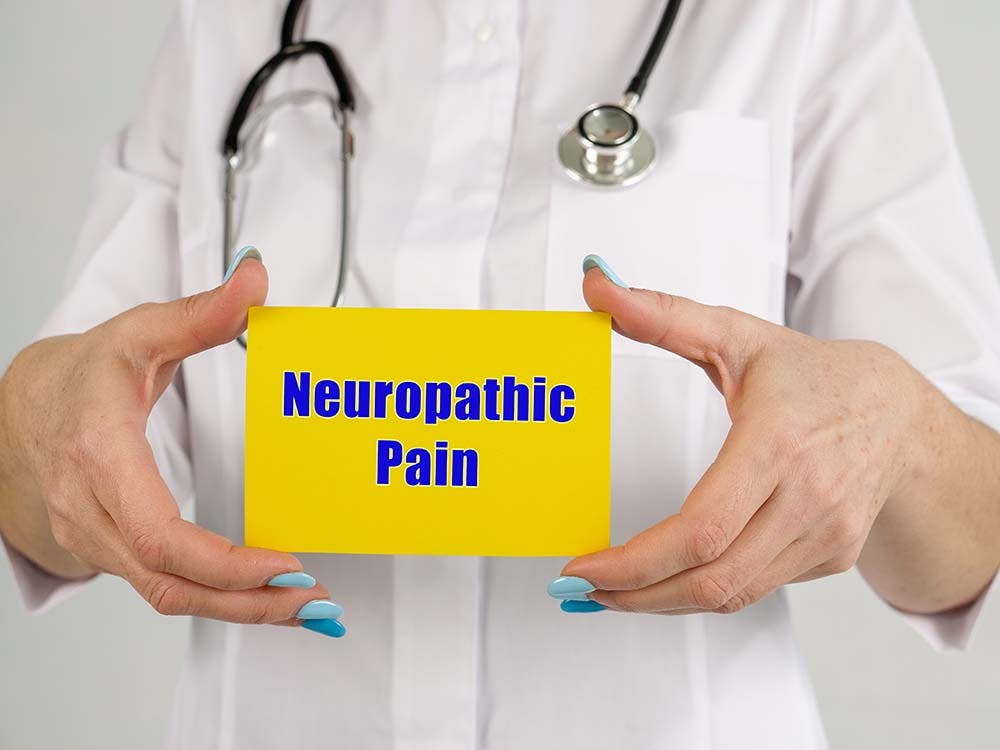Jan 18, 2022
Neuropathic Pain: What You Need to Know

Did you know that more than 7 trillion nerves make up the body's nervous system? With all those nerves, there's a chance one or more may experience a trigger to cause you discomfort.
In fact, between 3% and 17% of adults suffer from chronic neuropathic pain in the United States. It also affects around 10% of the world's population.
Whether you or a loved one are experiencing neuropathic pain, it's important to know what it is, what causes it, and the treatment options available to help support your journey in managing it effectively.
What is neuropathic pain?
Often chronic, neuropathic pain develops when the nervous system is damaged or not working correctly due to disease or injury. It's also referred to as nerve pain.
Neuropathic pain vs. Nociceptive pain
Nociceptive pain is usually acute and is the body's response to an injury or illness. Our bodies have specialized nerve cells, nociceptors, that can detect harmful stimuli and pass these dangers to the brain through the nervous system. As a result, nociceptive pain happens quickly to stop us from incurring any more harm. For example, the pain from touching a hot stove makes you pull your hand away.
Neuropathic pain doesn't develop in response to any specific circumstance or outside stimulus. In fact, up to 78% of people who have had an amputation experience phantom limb pain, neuropathic pain in a body part that is no longer there.
Symptoms of neuropathic pain
Symptoms vary from person to person, depending on many factors. However, common symptoms that stem from neuropathic pain are:
Shooting, burning, stabbing, or sharp pain
Tingling and numbness
Sensitivity to touch
Spontaneous pain/pain that comes without stimulation
Muscle weakness
Trouble sleeping
Lower back pain
Emotional issues due to other symptoms
Causes of neuropathic pain
The cause of neuropathic pain can be divided into four categories; disease, injury, infection, and loss of limb. Health conditions that are the common cause include:
Diabetes
Multiple sclerosis
Stroke
Amputation
Shingles
Nerve damage from surgery or trauma
Viral infections- HIV, Epstein-Barr virus, and hepatitis
Autoimmune Diseases- lupus, Guillain-Barre syndrome, rheumatoid arthritis, and Sjogren's syndrome
Alcoholism
How is neuropathic pain diagnosed?
Getting an official diagnosis by your physician can improve your functionality and relieve your discomfort.
Your doctor may perform all or just a few of these exams to properly diagnose if you are suffering from neuropathic or nociceptive pain and determine the appropriate treatment.
Review of medical history
The doctor will ask you questions about you and your family's health history. This assessment may include gathering information on:
all symptoms you are experiencing
your lifestyle
any recent exposure to any toxins
The more information you can provide your healthcare provider, the better it will be to find the cause of the symptoms and get you started on the proper treatment.
Physical exam
Just like your yearly physical, your doctor will examine for anything out of the ordinary. They will most likely spend more time accessing the areas experiencing symptoms, like numbness or tenderness.
Blood tests
Your doctor may order several blood tests to determine the cause of nerve damage. These tests can look for high blood glucose levels, thyroid function issues, diabetes onset, vitamin deficiencies, infections, etc.
Imaging tests
Your physician may also order a CT or MRI scan to search for herniated discs or abnormalities that might be causing nerve damage.
Additional nerve function tests
An electromyogram (EMG) uses electrical impulses to measure muscle and nerve movement. If you are experiencing neuropathic pain symptoms, your physician can use this test to determine the level of damage to the nerves.
Treatment options for neuropathic pain
There is no treatment to cure or prevent neuropathic pain. However, starting treatment quickly can help manage symptoms and prevent or lessen problems that often follow neuropathic pain such as depression and insomnia.
Treatment options that are often used for managing neuropathic pain are:
Anticonvulsants- Gabapentin and Lyrica
Antidepressants- Prozac, Zoloft, and Cymbalta
Opioids- Hydrocodone, oxycodone, and morphine
Injections/nerve blocks
Transcutaneous electrical nerve stimulation (TENS)
Percutaneous electrical nerve stimulation (PENS)
Acupuncture
Alternative therapies- meditation, reflexology, aromatherapy, and homeopathy.
Lifestyle changes- following a balanced diet, doing gentle exercise, increasing water intake, and avoiding smoking and drinking alcohol
Working with your physician/healthcare provider can help you find the treatment(s) that work best for your body. Never start or stop a medication, diet, or exercise program without consulting your doctor first.
Final thoughts
Neuropathic pain may get worse instead of better over time and can lead to severe disability in some people. A multidisciplinary approach that integrates treatments is often effective in relieving neuropathic pain.
At CareCard, we are passionate about helping make your prescriptions more affordable, saving members up to 85% on prescription drugs and medications. Learn how CareCard can help make your medication payments more manageable.